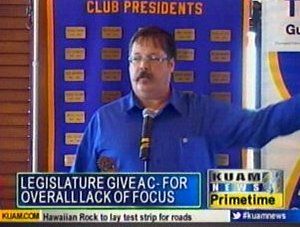UOG professor grades GovGuam
The Executive Branch of the Government of Guam as well as the Judiciary apparently are making the grade and doing what is exactly required of them.

Guam - The Executive Branch of the Government of Guam as well as the Judiciary apparently are making the grade and doing what is exactly required of them. However, the Guam Legislature isn't doing as well as several problems plague it as a body.
An overall lack of focus, critical gaps in the governing process and an obsession about the military buildup to the detriment of both the community and buildup itself are just some reasons as to why the Guam Legislature scored a 'C-' and the lowest grade in University of Guam professor and political analyst Ron McNinch's assessment and grading of the island's public sector.
He stated, "The reason the Legislature got a 'C-' is because there are some really, really good senators who are doing some really good things and then there are some fallen angel types in the legislature." He added, "The Legislature on the one hand throws all the political headaches of education into an education policy board then on the other hand they micromanage what education is supposed to do."
He additionally said that other issues include the seeming false belief that the quantity of bills matters along with a huge overlap as to what the governor is doing and what the legislature thinks it should be doing as if it were the governor such as veto overrides.
The Guam Judiciary meanwhile was graded a 'B' because unlike many other state-level judiciaries, have a large law enforcement based bureaucracy that muddles its role and could be improved with better coordination with the Executive Branch. That very branch scored an 'A-' and was cited for their active communication with the legislature on several goals and their transparency with the public.
"And instead of going to the courts for a lot of issues sought very pragmatic solutions and they sought to solve problems and they even pushed through difficult things like the bond issue that took a lot of work," he said.
McNinch did offer suggestions to the legislation, such as calling a simple constitutional convention and pass a basic organic-focused constitution. He did note several truths about aspects of the government, namely how Guam needs the U.S. military far more than it needs us, and how Guam failed in Round One regarding the military buildup. "There's a clear disconnect between what a small number of elected leaders thought and said in between what the majority of people on Guam thought and said," he shared. "So we ended up with the some elected leaders focusing their attention on less than 20 percent of the community to the detriment of the other 80 percent, and that was the reality."
He adds leaders cut out the average citizens in the input process regarding the buildup and took information at face value without fact-checking or verification.

 By KUAM News
By KUAM News